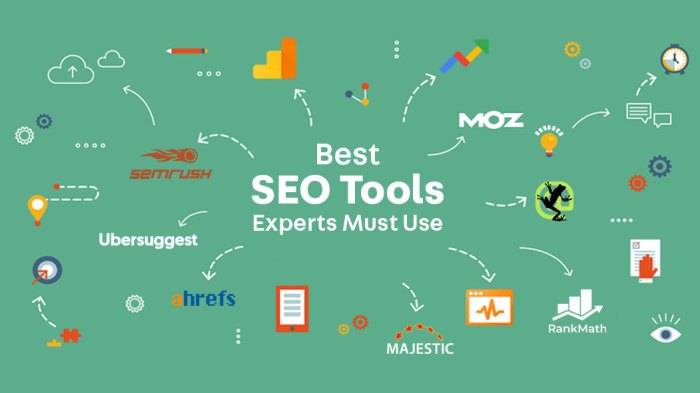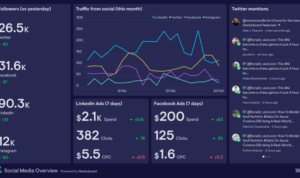Using SEO Tools – Kicking off with Using Tools, this introduction dives into the world of optimizing website performance with a touch of hip and modern flair.
Exploring different types of tools and their benefits in digital marketing strategies awaits you in the following paragraphs.
Introduction to Tools: Using SEO Tools

In today’s digital world, having a strong online presence is essential for businesses to succeed. Search Engine Optimization () plays a crucial role in improving website visibility and driving organic traffic. One of the key elements in implementing successful strategies is the use of tools.
Types of Tools
- Research Tools: Tools like Google Planner, SEMrush, and Ahrefs help in identifying relevant s with high search volume.
- On-Page Tools: Tools such as Yoast and Moz Pro assist in optimizing website content, meta tags, and headings for better search engine rankings.
- Link Building Tools: Tools like BuzzSumo and Ahrefs aid in discovering quality backlink opportunities to improve website authority.
- Rank Tracking Tools: Tools like SEMrush and SERPWatcher monitor rankings and track progress over time.
- Technical Tools: Tools like Screaming Frog and Google Search Console help in identifying and fixing technical issues that may impact performance.
Benefits of Tools in Digital Marketing
- Improved Website Performance: tools provide valuable insights and data to optimize website content and structure for better visibility and user experience.
- Time Efficiency: Automating tasks with tools saves time and allows marketers to focus on strategy and analysis.
- Competitive Analysis: tools enable businesses to analyze competitors’ strategies and identify opportunities for improvement.
- Measurable Results: By tracking key metrics and performance indicators, tools help in evaluating the effectiveness of campaigns and making data-driven decisions.
- Stay Updated: tools keep marketers informed about industry trends, algorithm updates, and best practices to stay ahead in the ever-evolving digital landscape.
On-Page Tools

On-page tools are essential for optimizing content directly on the website to improve search engine rankings. These tools help analyze and enhance various aspects of a webpage to make it more -friendly and user-friendly.
Popular On-Page Tools and Features
- Yoast : Yoast is a popular WordPress plugin that provides real-time content analysis, optimization, and readability checks to improve on-page .
- Screaming Frog: Screaming Frog is a website crawler tool that helps in auditing websites for on-page issues such as broken links, duplicate content, and missing meta tags.
- Google Search Console: Google Search Console offers insights into how Google views your website, identifies indexing issues, and provides recommendations for improving on-page .
- SEMrush: SEMrush is an all-in-one tool that offers features like research, site audit, and on-page recommendations to optimize content for search engines.
Benefits of On-Page Tools
- Optimizing Content: On-page tools help in optimizing content by suggesting placements, meta tags, and other elements that improve search engine visibility.
- Identifying Issues: These tools can identify on-page issues like broken links, duplicate content, and missing alt tags, allowing for quick fixes to enhance website performance.
- Improving User Experience: By optimizing on-page elements, these tools help in creating a better user experience by making the content more relevant and accessible to visitors.
Off-Page Tools
When it comes to improving website authority, off-page tools play a crucial role in building a strong online presence. These tools are essential for link building, outreach, and ultimately enhancing online visibility.
Key Off-Page Tools for Link Building and Outreach
- Ahrefs: A powerful tool for analyzing backlinks, conducting research, and monitoring competitor strategies.
- Moz Link Explorer: Helps in discovering link building opportunities, analyzing anchor text, and tracking link metrics.
- SEMrush: Offers insights into competitor backlink profiles, helps in identifying high-quality link prospects, and monitors brand mentions.
Contribution of Off-Page Tools to Enhancing Online Visibility, Using SEO Tools
- Improve Website Authority: By analyzing backlinks and monitoring link metrics, off-page tools help in building a strong backlink profile, which enhances website authority in the eyes of search engines.
- Enhance Brand Awareness: Through link building and outreach, off-page tools help in increasing brand visibility and attracting more traffic to the website.
- Boost Search Engine Rankings: By acquiring high-quality backlinks and implementing effective outreach strategies, off-page tools contribute to improving search engine rankings and driving organic traffic.
Technical Tools
When it comes to optimizing a website for search engines, technical tools play a crucial role in identifying and fixing various issues that may affect a site’s performance. These tools help website owners and developers ensure that their site is running smoothly and efficiently, ultimately improving its visibility and ranking on search engine results pages.
Site Audit Tools
Site audit tools are essential for analyzing a website’s overall health and identifying any technical issues that may be impacting its performance. These tools scan the site for errors such as broken links, missing meta tags, duplicate content, and more, providing detailed reports that highlight areas for improvement.
- Screaming Frog Spider: This tool crawls websites to analyze key elements for , including broken links, page titles, meta descriptions, and more.
- SEMrush Site Audit: SEMrush offers a comprehensive site audit tool that helps identify technical issues, such as crawlability, indexability, and more.
Speed Optimization Tools
Website speed is a critical factor in user experience and search engine rankings. Speed optimization tools help website owners analyze and improve their site’s loading times, ensuring a fast and seamless user experience.
- Google PageSpeed Insights: This tool analyzes a website’s performance and provides suggestions for improving page speed on both desktop and mobile devices.
- GTmetrix: GTmetrix offers detailed reports on a website’s speed performance, highlighting areas for optimization such as image compression, browser caching, and more.
Other Technical Tools
In addition to site audit and speed optimization tools, there are various other technical tools that assist website owners in optimizing their site for search engines. These tools help monitor site health, improve site structure, and enhance overall performance.
- Google Search Console: This free tool from Google helps website owners monitor and maintain their site’s presence in Google search results, providing valuable insights into search performance, indexing issues, and more.
- Schema Markup Generator: Schema markup tools help website owners create structured data markup to improve the way search engines read and display their content in search results.





